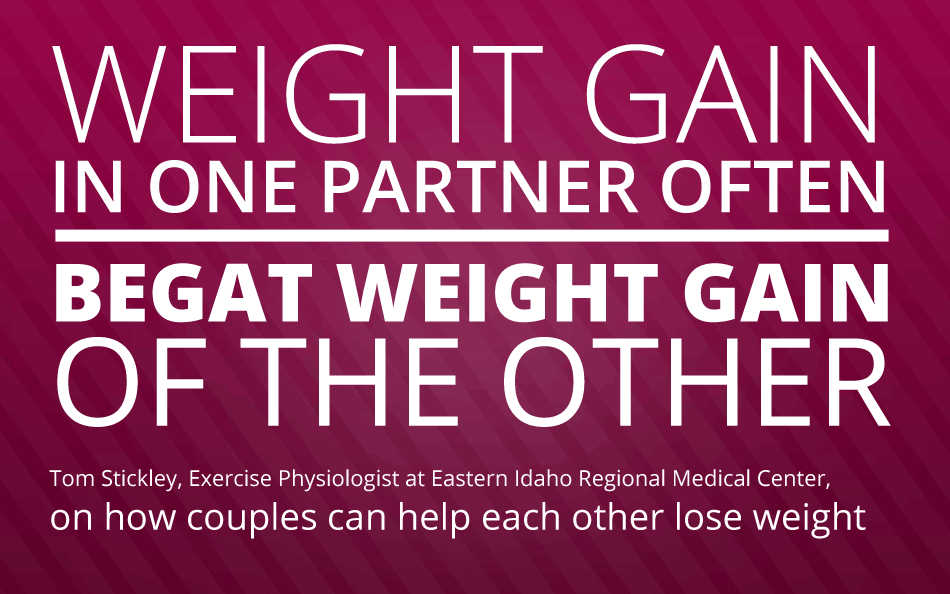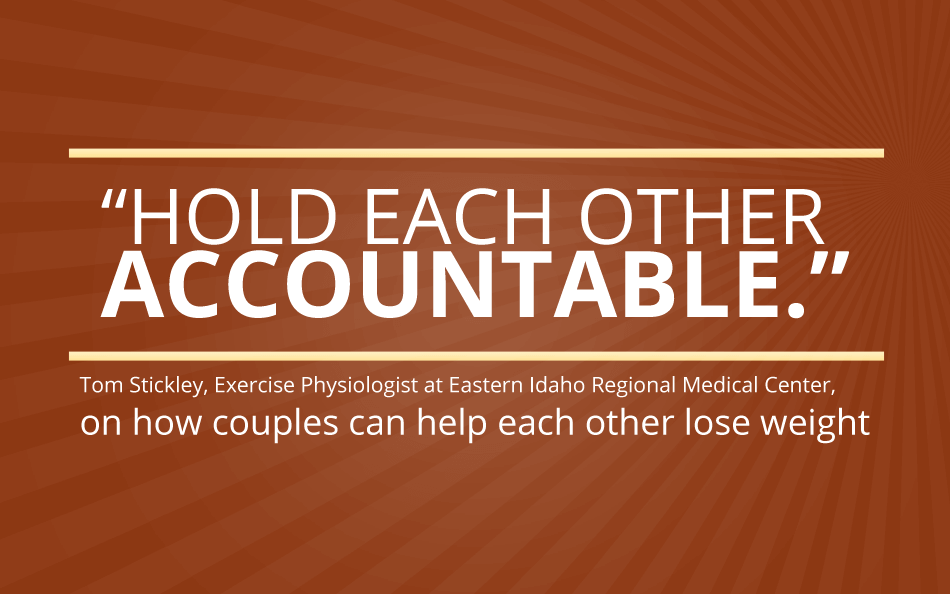The wedding was beautiful and so was the honeymoon. Notice the past tense: was. You've been married for a while now and it's time to face the facts”you've both gained weight. And you can't ignore it any longer.
Your spouse thinks it's time to stop making excuses.
But when you finally do take that first step on your weight loss journey, what if you feel like you're traveling alone? What if your spouse only wants to lose weight in theory, but you want to do it for real?
 - Tom Stickley, Exercise Physiologist at Eastern Idaho Regional Medical Center, on how couples can help each other lose weight
- Tom Stickley, Exercise Physiologist at Eastern Idaho Regional Medical Center, on how couples can help each other lose weight
Does Support Matter?
“Support is a huge component in weight loss,” says Tom Stickley, Exercise Physiologist at the Wellness Center of Eastern Idaho Regional Medical Center. “If an individual doesn't feel supported in their efforts they are far more likely to give up.”
Despite the importance of support, some people may feel like the opposite is true”that their spouse is actually working against them when it comes to weight loss.
Is Your Spouse Sabotaging Your Weight Loss Efforts?
Sometimes people may be less-than-supportive of their partners' efforts to lose weight.
“I've known many instances where one partner was very fit and health conscious and the other could not care less,” Tom says. “This even goes as far as trying to sabotage the one trying to be healthier, rather than being happy for them.”
This can lead to “a small layer of resentment and insecurity on both ends,” Tom adds.
This may be because starting a weight loss journey means making changes in your day-to-day routine, and change is not always met with open arms by everyone who's affected”new foods, another task added to the to-do list. All the change can feel forced. This is especially true when only 1 person in the relationship is trying to lose weight.
 - ”Tom Stickley, Exercise Physiologist at Eastern Idaho Regional Medical Center, on how couples can help each other lose weight
- ”Tom Stickley, Exercise Physiologist at Eastern Idaho Regional Medical Center, on how couples can help each other lose weight
What are Some Ways to Avoid Sabotage?
In some cases, the effect of family dynamics and support on weight loss is even greater than a person's genetic makeup, according to the Obesity Action Coalition. This means that creating a supportive and healthy home environment is an important part of the weight loss process.
Shift the focus away from food
A lot of people use food as a way to bond with their partners, says the AARP. But if you re-frame your bonding experiences around activities that emphasize quality time together”such as biking together or going dancing”you'll be working on your relationship as well as your physical health.
Set realistic goals
It's important that you avoid setting weight loss goals that are simply unrealistic.
“Very long-term goals often seem lofty and so out of reach that a person gives up shortly after they've begun, feeling they aren't making the progress they think they should be,” Tom says.
Instead, “Agree on simple, attainable goals like taking a short walk each day or eating a serving or two of vegetables daily,” he suggests.
Achieving small goals can add up to tackling greater challenges.
Most importantly, plan ahead
“Plan, plan, plan!” Tom says.
That means planning meals, exercise time and doctors' appointments. Then, plan for anything that could mess up the plan.
Try planning out your meals at the beginning of each week. That way, you can grocery shop for the foods you need and prepare some of the dishes ahead of time. Then, when you're on the go, you won't end up at the drive-through.
The same goes for exercise. That may mean recording your favorite TV show for later so you can go on a jog with your partner. “Sometimes sacrifices have to be made in order to make exercise a priority,” Tom says.
“Weight-loss takes time, consistency, discipline, education and support,” Tom adds, “and did I mention, planning?”
Learn more about how the weight loss team at the EIRMC Wellness Center in Idaho Falls can help you and your partner lose weight. Give them a call today at (208) 535-4200!
$webqFacilityNumber
Need a Physician?